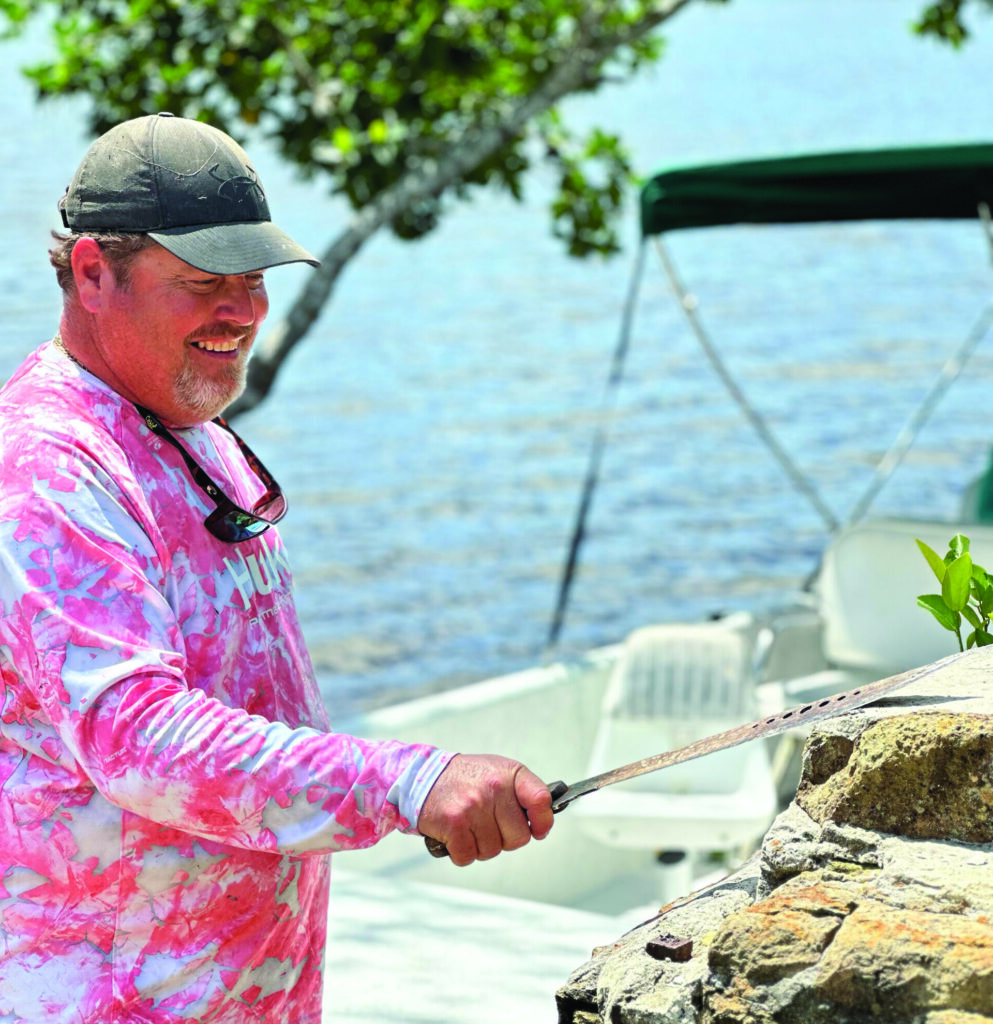Local history, murder mysteries and tales of environmental change intrigue guests on Smallwood Store boat tours of Everglades National Park in the Ten Thousand Islands.
A dolphin jumped after the boat as Capt. Corey McMillin of the Smallwood family of Chokoloskee shared humorous jokes and interesting stories from the area on his popular “Bloody Watson” tour.
Boat tours depart from Smallwood Store and take visitors to Watson Island to see the remains of the farm established by the notorious hotheaded and murderous Edgar J. Watson. Reportedly, Watson was killed by Chokoloskee townsfolk during a major hurricane around October 10, 1910. This was a revenge killing, partly to protect the Chokoloskee residents, as Watson had been killing people in exchange for payment for work and goods.
Some say it was the whole town, others say it was the wrong man, McMillin said.
On the way to Watson’s Island, a 40-plus acre property, McMillin told stories of outlaws, murder, and the revenge ultimately exacted on Watson outside McMillin’s family store, the Smallwood Store. Smallwood Store is now a historic site. McMillin’s grandfather, Ted Smallwood, who founded the U.S. Post Office and trading post on the island in 1906, was not involved in the murder, McMillin’s family said.
“At Watson’s Place we have gumbo limbo trees that grow in the highlands. We call them ‘tourist trees’ because they turn red and peel in the sun, just like tourists. ” McMillin said with a laugh.
He pointed to an avocado tree on the island.
“Santini brought me an avocado. Watson cut Santini’s throat after a fight in Key West.”
Adolphus Santini survived the murder attempt.
When McMillin grabbed a machete and ushered the boat tourists from the boat onto the wooden pier at Watson’s Place, it seemed like the ideal time to tell the story. The island is now a campground that can be reserved through Everglades National Park.
Watson Island also seems like an ideal place to tell ghost stories around a campfire. The bloodiest part of my recent summer stay may have been the mosquitoes.
As McMillin used a machete to clear a section of overgrown trail, he noted new signs erected by the National Park Service. Somehow he seemed to attract all the mosquitoes to his calf and keep most of them away from his guests.
Mr. McMillin pointed to an old reservoir that still holds water and described its two-story house and the remains of a sugar cane mill. He knows stories of generations of outlaws, most of whom came to the area around the turn of the century to retreat away from law enforcement and regulations. He also knew both native and exotic plants and provided his unique perspective on the changes in the landscape over the decades.
“That’s my mother-in-law’s tongue,” McMillan said, pointing to the plant. “It’s because the leaves are long and pointed.” McMillan said it was a popular funerary plant at the time and remains on many islands in the region.
Watson’s temper was especially bad when he was drunk, McMillin said, and “people would work for him, and when it was time to pay, they would stab him over the head, or put a chain or a brick on him, or drop him in the water.”
Watson was also known for being a very good shot from long range. McMillin said Watson was sitting on his porch drinking when U.S. Marshals arrived.
“When the marshal raised his badge, a bullet blew his mustache off,” he added. “He wasn’t doing it to scare people. He was trying to kill them. He was just drunk.” Somehow, McMillin said, the marshal survived.
Watson was known to wander through the woods and disappear whenever anyone came looking for him, where legend has it he had a large stash of money.
McMillin also pointed out areas on the islands where marijuana has been hidden in past decades.
Planes would land on Watson Island and smuggler Totch Brown would hunt deer there because they were some of the largest in the country, McMillin said.
“Now, you can’t even land a helicopter here. The mangroves have swallowed the land and taken over everything,” he said.
Many of the old family members remain friends, they say, including descendants of the Watson family who still spend time with the Smallwoods and McMillins.
Many of them, including McMillin’s grandmother, owned dozens or more acres of land that was taken by eminent domain to create Everglades National Park. The family has mixed feelings about that: They’re glad that some land remains undeveloped, but they also feel that by no longer having their own private island, they’ve missed out on an opportunity to experience the lifestyle of their ancestors.
He recalled a time when there weren’t as many mangroves on the land and there was more grass. McMillin said endangered American alligators have been seen on the islands, but it’s difficult to predict where they will be during mating season.
“Old crocodiles can grow up to 20 feet long and have a girth about the same size as a manatee. They have a torpedo-like build. When they get that big, they have a lumpy head,” McMillan said. he said.
The two-hour tour ended with a return to the Smallwood Store.
“This has been the most fun I’ve had in my two years in Florida,” said Nigel Heinsius, who moved to Fort Myers from Seattle two years ago.
To book these or any other boat tour, visit smallwoodstoreboattour.com, call 239.695.0016, or email info@smallwoodstoreboattour.com.
The Smallwood Store is located at 360 Mamie Street in Chokoloskee, where tours begin and end.
This article was published in The Naples Press on May 17th.


